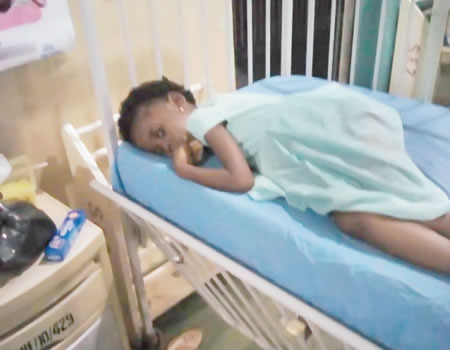At first, Ifeoluwa (surname withheld) was assumed to have been down with common malaria. But that was a bad guess as her condition continued to deteriorate despite the treatment that was administered on her. She had high temperature and complained of acute aches that relieved her occasionally. Although a test that was taken later revealed that she had traces of malaria parasite in her blood, her condition did not improve as the ailment was said to be resistant to the drugs and treatment given at the primary health centre in her community.
The six-year-old girl was taken to the University Teaching Hospital (UCH), Ibadan for comprehensive medical tests and treatment. The malaria and wider tests taken at UCH were also said to be negative. The blood count test, the genotype, X-ray, urine test, faeces, heart test and many more were all said to be negative.
At a point when her parents became frustrated and jittery about the hope of survival of their daughter, a medical doctor (does not want his name in print) who took her case history disclosed to them that two of his children had been down with prolonged malaria similar to what Ifeoluwa experienced for almost five weeks. The doctor said that the ailment was complicated by a viral infection. He stressed that the malaria attack currently on the prowl had been made worse by viral infection making the ailment resistant to routine malaria treatments.
Ifeoluwa was on admission for 10days at UCH before she was discharged from the Children Ward on Saturday, August 25, 2018 and given new dates for medical checks. The young girl is now recuperating but many children in that condition were not as lucky as she is.
In April this year, the Federal Government said that malaria was responsible for 30 percent of child deaths and 11 percent of maternal deaths in Nigeria. According to the National Coordinator of National Malaria Eliminated Programme (NMEP), Dr Audu Mohammed, the complexity of malaria in recent time requires more comprehensive treatment. He said: “Malaria is still responsible for 11 percent of maternal mortality and 30 percent of child deaths.
“It contributes to 60 percent of out-patient visits to health facilities, 15 percent of low birth weight, maternal anaemia, still births, miscarriage and other pregnancy-related complications. The Artemisinin based Combination Therapies (ACTs) which was believed to be effective for fighting and eliminating malaria was recommended by the World Health Organisation.
However, the outcome of a study on Malaria Future for Africa, sponsored by a healthcare company called Novartis showed concerns about the signs of resistance of malaria to ACTs. The resistance has, for instance, been allegedly recorded in some countries in the South East Asia.
A Senior Registrar at the Department of Internal Medicine, Ladoke Akintola University Teaching Hospital (LAUTECH), Osogbo, Osun State, Dr Obasanjo Adebiyi, while speaking on the efforts being given to treatment of malaria, warned that no patient should assume that he or she had malaria when sick until a test was taken. He expressed worries that many people indulge in making wrong assumptions about the types of diseases or ailment they suffered without taking confirmatory test.
While stressing that issue of health remained vital and required quality medical intervention, he stated the need to maintain high level of hygiene in order to be free from taken ill too often. Saying that sicknesses arose oftentimes as a result of infection, he said for instance that: “Viral infection belongs to group of communicable diseases that is easily spread from person to person through various means. It ranges from influenza virus which causes upper respiratory tract infection to more worrisome types such as the group of hemorrhagic fever viruses (such as Yellow fever, Ebola and Lassa) among other classes of virus.
“However, since the onset of heavy rainfall this season there has been increased number of cases of patients (children and adult) who present with fever (usually very high Temperature), cough, catarrh and severe muscle pain ( Myalgia). Some also present with headache, poor appetite, diarrhea, vomiting and abdominal cramp. On few occasions some became unconscious and died. Sometimes, there are new cases of measles and mumps among others. You can begin to see people from the same family, or same household, school or locality spreading the symptoms from one person to the other.
“Many a times the presentation looks like malaria but an expert’s review can delineate the differences. Basic investigations will also be ordered in the hospital to further confirm this.
“The common rout of transmission include droplet from nasal discharge through sneezing, fomites (objects that spread infection which are touched by someone who has the virus and someone who doesn’t) such as Naira note, handle of doors etc, body secretions such as saliva. This is particularly worrisome in schools where many children are in the same class with poor ventilations, there is easy spread of such among the children and they are the ones who commonly bring it home to other members of the family, this is why the spread is common among the children during academic session than holidays. Same occur in Barracks and prisons”.
Speaking on the preventive measures, he said: “It is advisable that all children complete national routine childhood immunization against mumps, measles, yellow fever, rota virus, etc. Our level of hygiene at this period must be improved with regular hand washing with soap and clean water most especially while handling droplets from a sick individual. We must maintain a clean environment.
“Our houses should be well ventilated and not overcrowded. Schools should endeavor to exempt any child/student who has these symptoms from school to avoid spreading to others till such is healed. Schools should also imbibe culture of cleanliness to pupils/students. Eat balanced diet to boost immunity.
“Adequate water intake is also advised. Any sick individual should go to hospital promptly. Control of temperature is highly important, children can be given paracetamol and shower with lukewarm water before getting to the hospital to prevent febrile convulsion.”
Meanwhile, in a resolve to fight malaria resistance, Norvatis, like other health institutions, is engaging in clinical trials to evolve a potent cure for the resistant malaria. It was learnt that the ongoing trial by Norvatis on highest standard of treatment for malaria would be subject to three different phases in order to be sure of its efficacy.
In order to outsmart malaria and the threats posed to the society, Fidson Healthcare Plc., a health products manufacturing company, recently urged Nigerians to embark on nationwide preventive action against the threat of malaria. This is coming just as former President Olusegun Obasanjo noted that the country was losing close to N300bn annually to malaria and other preventable diseases. Obasanjo, while speaking at the launch and endowment for the proposed University of Medicine and Medical Studies proposed by the Federal Medical Centre, Abeokuta, noted that Nigeria was facing dismal medical challenges.
He said: “Nigeria loses about N300bn annually to the prevention and treatment of malaria, including the loss of man-hours and diminished productivity. It is common knowledge that 43 percent of the population lacks access to safe water, 35 percent lacks access to adequate sanitation and about 40 percent lacks access to public health services.”
WATCH TOP VIDEOS FROM NIGERIAN TRIBUNE TV
- Let’s Talk About SELF-AWARENESS
- Is Your Confidence Mistaken for Pride? Let’s talk about it
- Is Etiquette About Perfection…Or Just Not Being Rude?
- Top Psychologist Reveal 3 Signs You’re Struggling With Imposter Syndrome
- Do You Pick Up Work-Related Calls at Midnight or Never? Let’s Talk About Boundaries







